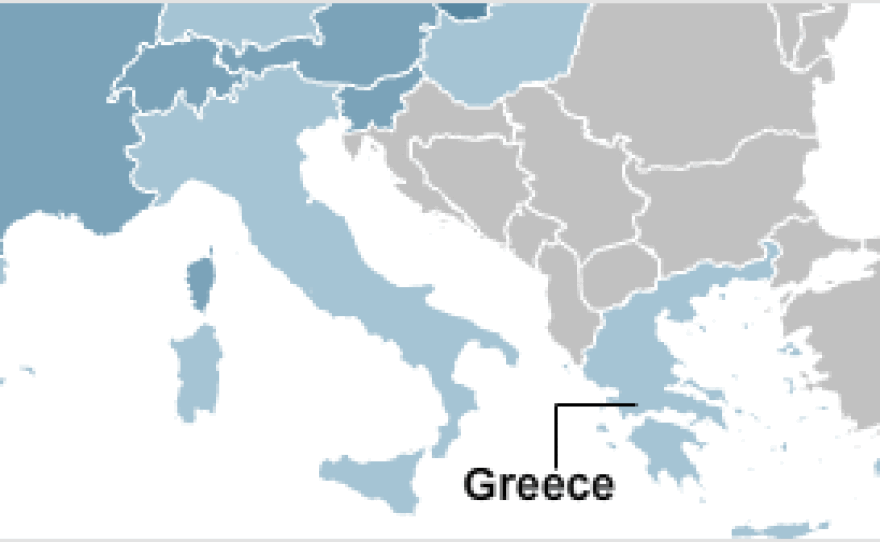Europe's debt crisis grew Wednesday when Standard & Poor's downgraded Spain's debt just as German and other European financial leaders met in Berlin to calm investors about the looming debt crisis in Greece.
The downgrade from AA+ to AA was a worrisome sign that the debt crisis is starting to spread to other European countries and devalue the euro.
On Wednesday, German Chancellor Angela Merkel, International Monetary Fund Managing Director Dominique Strauss-Kahn and European Central Bank president Jean-Claude Trichet said they're committed to accelerating the $59 billion (45 billion euros) in bailout funds to Greece.
Germany had been playing hardball to release its share of the emergency fund, saying Greece had to commit to spending cutbacks. But on Wednesday Finance Minister Wolfgang Schaeuble said Europe's biggest economy could have its contribution approved by Parliament by the end of next week. The announcement eases uncertainty that Greece might not get the money in time.
But experts tell NPR that even if the European Union and IMF give $59 billion in funds, European financial leaders are not out of the weeds. And if the crisis isn't contained, it could undermine the global economic recovery.
What sparked the debt crisis in Europe?
Once you have an acute crisis, then this is going to be the kind of crisis that fundamentally once again shakes confidence in the global financial system — like what you saw after Lehman Brothers.
On Tuesday Standard & Poor's slashed Greece's debt to junk level Tuesday, causing markets to tumble.
The Greek crisis was caused by "mismanagement, corruption and lack of transparency," according to Domenico Lombardi, senior fellow at the Brookings Institution.
He said the Europeans should have more closely scrutinized Greece's books before allowing that country into the eurozone in 2002.
"They should have exercised more due diligence on the Greek fiscal accounts," Lombardi said.
Portugal also faced signs of trouble when Standard & Poor's cut its debt rating Tuesday.
Last month, European leaders came together and agreed to a $59 billion emergency fund — $39.6 billion from EU countries and $19.8 billion from the IMF.
What's the larger long-term problem?
But even if the European Union and IMF ultimately release the $59 billion to Greece, it may only ease matters in the short term.
Greece has until May 19 to come up with about $11 billion to pay off debts, and that will be covered with the emergency fund. But experts say the country will need about $160 billion to $200 billion over three years.

Jacob Kirkegaard, research fellow at the Peterson Institute for International Economics, says he does not believe the eurozone is willing to put up that kind of money. "The 45 billion euro [bailout] is not going to be enough; you're going to have a situation where the eurozone is going to have to go back to their parliaments and ask for another bailout," he says. "The cardinal rule of any bailout -- if you want to threaten them into approving something they don't like to do -- the one thing you have to promise them is whatever happens, you won't come back and ask for more. And this is exactly what the eurozone is setting itself up for."
What's more, Germany has a constitutional "no bailout" clause, so its portion of the rescue package could be challenged in court.
"In my opinion, there is no doubt that the German constitutional court will rule [the bailout] illegal," he says.
Kirkegaard says the Europeans have not managed the situation very well, causing financial investors to lose trust.
"There's no doubt that what we've seen today and throughout the last couple of weeks has been an accelerating crisis of mismanagement by every European institution involved in this," he says.
How will this crisis affect the U.S.?
The European Union is a huge export market for the U.S. An economic crisis in Europe would make it harder for Europeans to afford U.S. exports. The euro will also decline substantially, says Kirkegaard, which would make it hard for the U.S. to compete against countries like China and Brazil because the dollar will be stronger than the euro -- making American goods too expensive.
What's more, while the U.S. doesn't have large exposure to Greek debt, it has more of a stake in the next vulnerable countries, particularly Portugal and Spain. So if the crisis spreads to those nations, "the direct ripple effect could be more dramatic," Kirkegaard says.
"Once you have an acute crisis, then this is going to be the kind of crisis that fundamentally once again shakes confidence in the global financial system -- like what you saw after Lehman Brothers," he says. "Then you have the risk of derailing the global economic recovery, which is bad news for everybody."
Does the U.S. have a role in a European rescue?
Experts say there's not much the U.S. can do to help the situation in Europe but wait and see.
"The U.S. is in a tricky situation," Kirkegaard says. "The more the U.S tries to do something, the more they will be seen by Europeans as meddling in European affairs."
The best thing the U.S. can do, he says, is encourage the IMF to propose expanding the safety net to other vulnerable countries, like Portugal and Spain.
"I don't think there's much the U.S. can do on its own so to speak," he says.
Lombardi agrees: "I'm afraid it's very much a European issue."
With additional reporting from the wires
Copyright 2022 NPR. To see more, visit https://www.npr.org. 9(MDAzMjM2NDYzMDEyMzc1Njk5NjAxNzY3OQ001))






